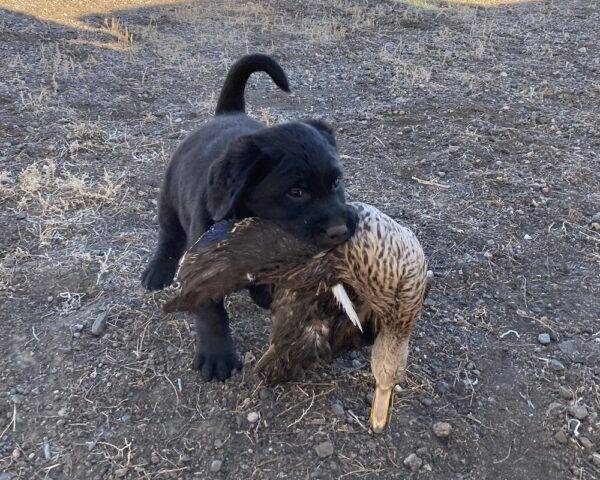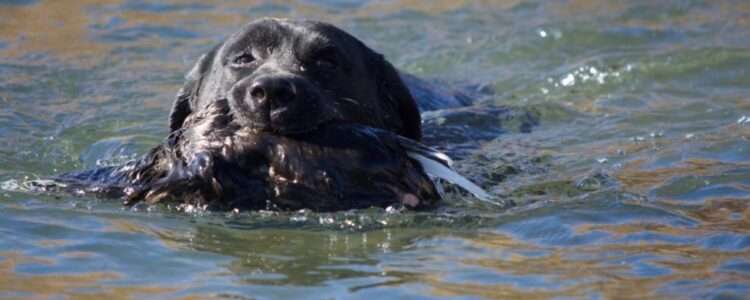
After a rewarding hunting season, you might find yourself looking for more challenges and opportunities to bond with your dog. That's where hunt tests come into play.
Some hunters may feel their dogs are skilled enough without needing titles and ribbons, but hunt tests offer much more.
It's a great way to keep your dog active and in sync during the off-season. Plus, it's an opportunity to showcase your dog's abilities and to connect with others who share the same passion. Many lifelong friendships are forged while training and competing.
With your curiosity piqued, I'll bet you're wondering, "What can I expect at a hunt test?" Well, grab your favorite beverage and settle in to learn about the fascinating world of retriever hunt tests.
History
Retriever breeds have competed in field trials in the US since the 1930s. In the beginning, the tasks required of the dogs were not much different than we see in hunt tests today. But as the dogs got better, the tasks got harder. And as the tasks got harder they became less like hunting.
Eventually, hunters wanted a way to test their dogs' actual hunting abilities. A few different programs were tried but with little success.
Then in 1979, Omar Driskill started a "gun dog club" in Louisiana that became very popular. A few years later Bill Tarrant wrote an article saying that field trials were producing dogs that were different than what the average hunter wanted. And Richard Wolters (author of "Water Dog") wrote an article asking if there was a need for the hunting retriever movement.
Hunting enthusiasts got together in New York to discuss forming an organization for hunting retrievers. Present were trainers, writers, and representatives from AKC and UKC.
First Hunt Tests
Based on that meeting, the first hunt test was held in Arcadia, LA in 1983 under rules developed by the North American Hunting Retriever Association ("NAHRA").
A year or so later HRC was formed and shortly after that AKC held its first retriever hunt test. Because of their common start, the rules and the stakes offered are very similar. The tests are not competitive so the dogs pass or fail on their own merits. There are three basic levels with titles in each organization.
In 1985, the first year that AKC licensed tests, there were 13 events with 681 entries. By 2005, there were 341 events with nearly 35,000 entries.
It wasn't long before owners who had titled their dogs in Master or Finished, wanted something more to achieve. This led to the development of the Master National Hunting Test (affiliated with AKC) and HRC's International Grand Hunt.
Something the original organizers probably didn't consider is as training methods improved the tests would gradually became more difficult. A Junior stake 20 years ago was very different from tests today despite the rules changing very little. This seems to be the case in both organizations, but it's a bit more apparent in AKC tests.
Getting ready
AKC vs HRC hunt tests
The AKC and the HRC offer similar hunt tests. Each offers three levels for weekend hunt tests, plus a more difficult annual (twice annually for HRC) test. HRC also offers an Upland test.
AKC requires handlers to wear "dark or customary hunting attire". HRC requires the handler to wear ALL camo - shirt and pants, shorts, or a skirt. Hats and waders, if worn, also need to be camo.
Titles earned in AKC hunt tests are listed after the dog's name, while HRC titles are listed before the name.
The levels are:
| AKC | HRC |
| Junior / JH | Started / SHR |
| Senior / SH | Seasoned / HR |
| Master / MH | Finished / HRCH |
| Upland / UH | |
| Master National / MNH | International Grand Hunt / GRHRC |
The rules are similar, but not exactly the same. Be sure to check before entering and running your dog. It is a good idea to read the rule book, making notes and highlighting important information so you can find it easily when you need a refresher.
Although you don't have to be a member of a club to run a hunt test, having a group to train with can be very helpful. Also if you run HRC there are additional fees if you are not a member of the national club or if your dog is not UKC registered.
Find a local AKC club (select 'Hunting Test' and your state)
Find a local HRC club (click on 'State' to group clubs by state)
Join HRC (national club) It's not expensive and you get an informational magazine six times per year.
You can start the UKC registration process here. If your dog is AKC registered, have that information handy to fill out the UKC form.
Allowed breeds:
You'd think retriever hunt tests would be for retrievers, but both organizations opened the tests up to many hunting breeds. In a nutshell, they allow retrievers, plus Standard Poodles and a variety of spaniel and pointer breeds.
Spayed/neutered dogs and dogs that would be disqualified in the show ring are also welcome.
AKC restricts the hunt tests to dogs over six months, individually registered (not just litter registration), and of eligible breeds. There are special rules for entering imported dogs that are not yet registered with AKC.
HRC limits the tests to hunting breeds on their list which does not include dilutes (the "Silver Labs"). Note: if a dilute dog is entered in a hunt test the hunt test committee should be notified.

Click to watch a video of Omar Driskill talking about the start of hunt tests.
Junior vs Started hunt tests
The Junior and Started tests are very similar. They include two series - a land series and a water series with two single retrieves on land and two single retrieves on water.
Both allow you to hold your dog at the line. In Junior, you can loop a slipcord through the collar which must be a flat buckle collar. Or you can hold the dog by the collar. In Started, you can hold the dog by a collar, leash, or line around its neck. (As a judge, I always recommend holding your dog. If you don't and your dog breaks, he will likely fail.)
A change in AKC rules as of August 1, 2023 allows handlers to speak quietly to their dog and be allowed to touch their dog for reassurance or positioning. This is only allowed at the Junior level.
You don't handle a gun in AKC and rarely handle one in HRC although in HRC you can opt to shoulder and shoot a popper. However in that case you cannot hold your dog and you are also judged on gun safety.
There are some differences
You'll need a whistle in either test and a duck call in HRC. Although the AKC premium usually says to bring a duck call, many judges don't require it. You should, however, have your own duck call, know how to blow it, and have your dog used to it. Just in case.
The maximum distances are different. In AKC, the test distance on land and water "should not normally exceed 100 yards." But in HRC, the "maximum land test distance will not exceed seventy-five (75) yards, but may be less." The wording is the same for water, but the maximum distance is 60 yards. Some judges like to push the distance out further, particularly in AKC where the wording is not as definite.
You'll often stand beside your dog in AKC vs HRC where you'll generally sit on a bucket beside your dog. Be prepared to run your dog from either position.
Also, HRC limits the number of entries to 50 per flight. Most tests don't fill, but if you want to make sure you can enter check for when entries open and go online right after that time. Many clubs allow "walk ups" - entering the morning of the test, but only until the limit is reached. AKC doesn't limit entries.
Birds
Ducks are often used, but occasionally you'll see a mixed bag of ducks on water and upland birds on land.
In AKC, you'll have at least one shot flyer (unless using live ammunition is prohibited by law or the land owner). That means a live bird will be thrown in the air and shot. Depending on the skill of the gunners, your dog may have to retrieve a dead bird, a lightly-hit runner, or a hard-hit bird that would not be suitable for the table. In HRC the birds are usually humanely killed with gas on the morning of the hunt test. If your dog has never run an HRC test, you may want to ask if you can run a bit later. New dogs can be unsure of a bird that smells of gas, but the scent wears off quickly.
After the bird lands you must wait for the judge to release you in an AKC test. In HRC, you're allowed to send your dog as soon as the bird hits the ground or water. However, you should wait a couple of seconds so there's no question the bird landed before you sent your dog.
Marks
Sometimes a dog will start toward a mark and stop within about 15 feet. In AKC, the dog can be recast because he may be confused about if he was actually sent to retrieve it. This is different from a dog that goes to the area of the fall, fails to find the bird, and comes back to the handler. But in HRC you can cast your dog a maximum of two times from the line per bird. There isn't a limit on how far the dog can go or how long he hunts or is called back and cast a second time.
Your dog must deliver all birds to hand in AKC. If he drops it, perhaps to shake off water, you can tell him again to fetch it. You may have to tell him several times, but the more commands, the lower his score. On the other hand, if he's unwilling to release the bird he'll be scored low in Trainability, even to the point of failing. In HRC, your dog must deliver to your immediate area, but not necessarily to your hand. If the judges don't explain their measurement for "your immediate area" you should ask as it's not clearly defined. Generally, judges will allow you to take a long step to pick up the bird.
Second series
In AKC, the judges will confer after completing the first series. A dog that both judges have failed is not called back to run the second series. The judges will list the dogs (by number) that are passing and the marshal will advise handlers of the "callbacks." In HRC, you can continue to run your dog even if you failed the first series with some exceptions. Exceptions include a gun safety violation, dog fighting, or a handler ejected for bad behavior.
HRC awards five points per pass with 20 points required for the Started ("SHR") title. In essence, both AKC and HRC require four passes in Junior or Started for a title in that organization. Passes from a higher level do not count toward the Junior or Started titles.
Watch an AKC Junior Test or an HRC Started Hunt Test.
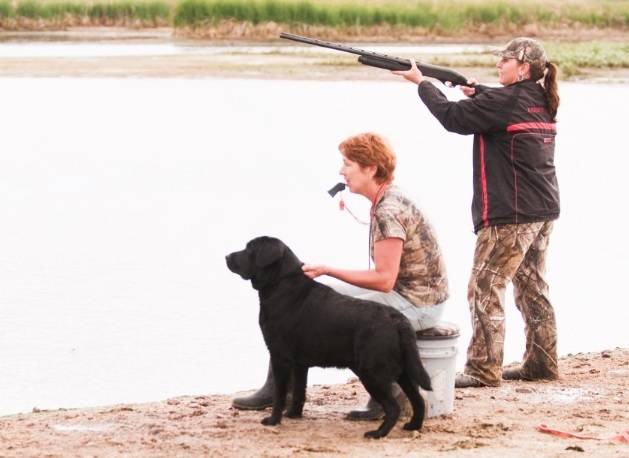
Senior vs Seasoned hunt tests
Although the basics are similar, there are a lot of differences between Senior and Seasoned tests.
What is similar
Both include double land and water marks, a land blind and a water blind, but they're run differently.
Senior has two series: land double and blind, water double and blind, plus at least one diversion shot, a walk-up to start one of the tests, and an honor. Dogs that fail the first series are not called back to run the second series.
Seasoned has five tests: a walk-up, a double land mark, a land blind, a double water mark, and a water blind. There is also a diversion bird.
Pretty similar except Senior has a walk-up to start a double while Seasoned does the walk-up separately.
Dogs run without a collar in both organizations, but when the collar or slip lead is removed is different.
In Senior it's removed before going to the line from the final holding blind. The dog is put back on a lead when the series is finished and the dog and handler are behind the judges. You may be asked to put your dog on a lead to honor if your dog has failed the test.
For Seasoned, the dog goes to the line on a lead and the lead is removed before starting the test. If the dog runs the marks and blind from a different line, the dog is put back on a lead when moving to the next line. The dog is also put on a lead when the series is finished.
Handlers in both organizations must shoulder the shotgun. Senior tests have a non-operational gun and there is no shooting from the line. Seasoned tests require handlers to shoulder, aim and shoot a popper at each bird.
Blinds must be outside of the marks and delivering the bird to hand is required in both stakes.
What is different
In Senior, the test distance on land and water "should not normally exceed 100 yards." While in Seasoned, the "maximum land test distance will not exceed one hundred (100) yards but may be shorter." The wording is the same for water, but the maximum distance is 75 yards. The blinds "will not exceed sixty (60) yards..."
Diversion shot(s) must be used and diversion bird(s) may be used in Senior. Seasoned requires a diversion bird that "can be thrown after the walk-up, blind, or last retrieve of a double mark." Switching to the diversion bird is a mark-down, but not a failure in Seasoned. Switching or returning to an old fall in Senior is a failure.
Seasoned can be cast from the line two times per bird, but in Senior the dog can be sent more than once only in cases of confusion. There is no second chance if the dog doesn't go when sent for a blind retrieve.
Popping isn't penalized in Seasoned. It is a mark-down in Senior, earning a bigger penalty the more the dog pops.
Senior dogs must honor a working dog at least once.
Also, HRC limits the number of entries to 40 per flight. If you want to make sure you can enter check for when entries open and enter online as soon as possible after that. I've never seen an AKC club limit Senior entries. However if there are too many entries to finish the test in one day, you may have to come back. If the test starts on Sunday, that means coming back on Monday.
Titling
If a dog has a Junior title, four passes are required for the Senior title. Without a Junior title, five passes are required.
The Seasoned ("HR") title requires forty (40) points for a title and can include points from Started (5 points), Seasoned (10 points), or Finished (15 points). However, only 10 points from Started can be counted toward the Seasoned title. Basically, if you have a couple of Started passes you need three Seasoned passes. Otherwise, four Seasoned passes are needed for the HR title. If your dog has a lot of training before running in tests, you can run Finished with each pass counting as 15 points. So three passes (45 points) for an HR title and those points count toward the 100 points needed for a Finished title.
Watch an AKC Senior Test or an HRC Seasoned Hunt Test.
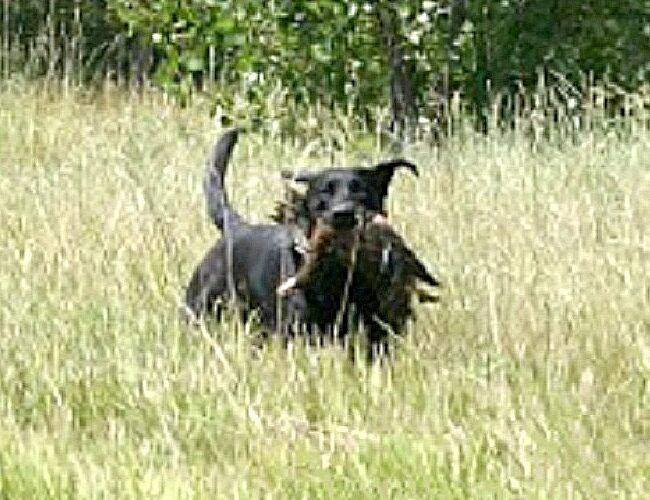
Master vs Finished hunt tests
In these tests, almost anything goes. There will be multiple marks, sometimes multiple blinds, diversion shots and/or birds, an honor and/or a walk-up. Dogs might run from a boat or from beside a layout blind. There may be a mixed bag of birds (for example, retrieving ducks and pheasants in the same series). Handlers of the working AND honor dogs may have to shoot at birds. There might be a "poison bird" (a bird the dog may not retrieve until he has done another task).
Luckily there are limits to what the judges can require.
What is similar
Dogs are taken off lead before leaving the holding blind. They are judged until the series is finished and the dog and handler are behind the judges. An exception is made when they've failed the test and have to honor on lead.
Although Junior or Senior entries aren't usually limited, Master can be - and often is - limited. Clubs can choose to limit the number to 66, 100, 132, or 200 entries or can have unlimited entries.
HRC limits the number of Finished entries to 30 dogs per flight. Many clubs schedule a second or third set of judges to run more flights
Master test requirements:
- has three series - a land series with multiple marks, a water series with multiple marks and a land and water series with multiple marks
- at least two of the multiple-marking situations must have three falls before the dog is sent to retrieve
- a land blind and a water blind with at least one double blind
- dogs must honor at least once
- there must be a walk-up, diversion bird and/or shots at least once
- will be scheduled to run over a minimum of two consecutive days
Finished test requirements:
- has four tests - a land triple, a water triple, a land blind, and a water blind - may be required to retrieve in an established sequence
- at least one of the triples must include an honor
- the blinds may or may not be included with one of the triple retrieves
- there must be a diversion as the dog returns from any retrieve
- the test is completed in one day
Test distances are similar
Master on land and water, shall not normally exceed 150 yards.
Finished land distance will not exceed 150 yards, but may be shorter. Water distance will not exceed 125 yards, but may be shorter. Blind retrieve distance will not exceed 100 yards.
Switching is similar
In Master it shall be scored low, to the point of failing.
In Finished switching to a diversion bird is a fail.
A controlled break is similar
Master dog fails.
Finished dog may be failed for a controlled break or excessive, consistent creeping.
The use of the shotgun is similar
A Master handler "shall always carry and shoulder an empty shotgun except when honoring the working dog or when running a blind."
A Finished handler "must shoulder the shotgun, aim, track, and shoot at the top of the arc of the thrown bird."
Titling
If a dog already has a Senior title, five passes are required for a Master title. Without a Senior title, six passes are required.
A Finished title ("HRCH") requires 100 points and points can be earned in Started (5 points per pass), Seasoned (10 points per pass) and/or Finished (15 points per pass). However, 60 points must be earned in Finished with a maximum of 40 points from Seasoned. If 10 points were earned in Started, then a maximum of 30 points can come from Seasoned.
Watch an AKC Master Test or an HRC Finished Hunt Test.
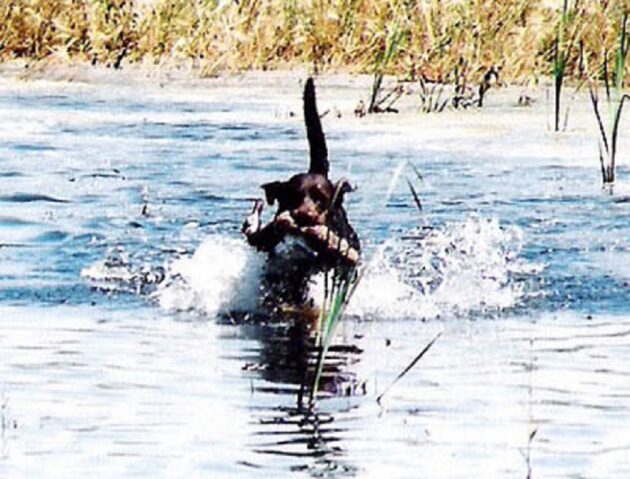
HRC Upland hunt tests
The Upland Hunter stake is designed for dogs trained to the Finished level. However dogs don't need to have any titles before entering an Upland test.
There is a simulated walk-up followed by a quartering test where the dog will locate and flush at least two birds. The handler must aim, track and shoot a popper at birds his dog flushes, keeping gun safety in mind. Once the handler has fired a shot, the official guns may shoot the bird, if it can be done safely. The dog must retrieve any birds shot for him and must honor another dog. Each passing score earns the dog 10 points with 40 points needed to earn an Upland Hunter ("UH") title.
Watch an HRC Upland test.

Master National vs International Grand Hunt
These events are very different from weekend hunt tests. Dogs must qualify to enter, their work is held to a higher standard, and the events are run over several days.
To qualify for the Master National, the dog must have passed six Master tests between August 1 of the year before the event and July 31 of the event year. There are exceptions for dogs running tests exclusively in Alaska or Canada. A dog that qualified at the previous year's Master National needs four Master passes to enter. A dog that has the MNH title doesn't have to requalify.
The Master National Hunter ("MNH") title requires three passes at the Master National Hunting Test. This title is in addition to the MH title. Unlike other hunt test titles, the owner must request the title certificate and pay a fee.
There is also a Master Amateur Hunting Title ("MAH") which is similar to the MNH. Dogs must pass the Master Amateur Invitational Hunting Test three times to title. The owner must request the title certificate and pay a fee.
Two Grand Hunting Tests are held each year and are open to retrievers that have earned a Hunting Retriever Championship ("HRCH") title. There are five series. Two series have multiple mark land tests with a blind retrieve and at least one honor and a diversion. The two multiple mark water tests must have a blind retrieve and at least one honor and a diversion. The fifth series consists of an upland quartering test.
Prompt and precise responses are expected from retrievers at this level. Distances may be longer than any weekend hunt tests. A quad or delayed quad and/or having the dog retrieve in a particular sequence can be used.
Watch a Master National or an International Grand Hunt.
Now it's your turn
Finding tests to enter
Tests in both organizations can be entered online. Go to EntryExpress for AKC or HuntSecretary for HRC. (Note: be sure to check both platforms if you're running AKC as some tests are showing up on HuntSecretary.)
Entries are limited in HRC and Finished usually fills up very quickly. Seasoned might fill up quickly as well. AKC tests can also be limited but generally only Master. Be sure to check for when entries open and close.
You can run your dog in HRC without a UKC registration, but you'll pay more, and your dog must be registered within 60 days of earning points or you forfeit those points. Note: it often takes a month or more to get your registration from UKC.
Preparing to go
Start a list of what you should bring so you're not scrambling at the last minute. For example, you might include a collar, leash, whistle, duck call, crate, bug spray, sunscreen, sunglasses, rain gear, jacket, rubber boots and/or waders, water, shade, fan for hot weather, camera or cell phone with a camera (be sure to turn off the ringer), chairs, sunshade, coolers with drinks, snacks, and lunch.
Don't forget "dark or customary hunting attire" for AKC tests. Or all camo for HRC tests. If your family or friends are coming make sure they don't wear anything white or neon colored.
Spray all your clothes with insect repellent about 3-4 days before the test and seal them in plastic bags until the day of the test.
Re-read the pertinent portions of the rule book.
And don't forget your dog! Don't laugh - it's happened.
Also, be aware of what not to bring: training aids such as an e-collar, heeling stick, prong collar, choke chain, and especially a female dog in season.
Morning of the test
Be sure you know where and when you're to meet and how to get there.
When you get there, check in with the hunt secretary at the headquarters and pick up a catalog. I mark my dog's number on the catalog, or if I'm running more than one dog I'll write their numbers on the back of my hand.
If you have a female, check where to take her so she can be checked. Females in season, cannot run the test.
Air your dog on a leash and pick up any solids. Be sure to listen for the call to gather. The hunt chair will tell you where the stakes are located, restroom locations, where to park, and rules for these grounds. No smoking and staying on roads are common rules. They will also have you go as a group to your stake.
When you get there, grab your whistle and duck call, and make sure your dog is comfortable with water and shade. Then go find the marshal and check in. If you're also running in another stake, let the marshal know. Sometimes the running order will be modified so handlers with several dogs that are running multiple stakes can finish one stake quickly. Be flexible if that happens.
Handlers meeting
When the judges are ready, they will call for a handlers meeting where they will describe the test and what they expect. They will also go over gun safety. Even fake guns must be treated as loaded when you're at a hunt test.
A test dog will run to demonstrate the test, and judges will answer any questions. If you don't understand something, ask. The only stupid question is the one not asked. Be sure to check where the gallery can gather and pay attention to any other instructions given.
Airing your dog
Ask the marshal where you can air your dog because you don't want air him where the next series will be run. Keep your dog on leash unless you are a very long way away from the line. Your dog will fail if he runs back and interferes with the running dog. Or worse if he starts a dogfight.
Don't throw a bumper for your dog near the test as that can be interpreted as training on the grounds that could lead to your dog failing.
Holding blind etiquette
Dogs can be failed if they see another dog run a series before they run. Do your best to keep your dog inside the holding blind and not peeking around, over, or even under the blind. Also, do your best to keep your dog quiet so you don't disturb the running dog.
If your dog takes a dump in the blind, let the marshal know so no one has to find it by accident.
To the line
Do not leave the blind until the judges call you to the line. Often they will first ask for your number (make sure you have this memorized) so they can have the correct page open before you come to the line.
If you still have any questions be sure to ask before running your dog.
Sit your dog facing the area of the fall, take your time getting you both ready, and make sure your dog is looking in the right direction.
When you have another handler and dog honoring your dog it's courteous to ask if they're ready before signaling to start the test. The honor is only in Senior, Master and Finished.
In an AKC test, let the judges know you're ready by nodding or waving a hand behind you. Do not turn around or your dog might get up. Wait to send your dog until the judge calls your number. In an HRC test, judges often have you blow a duck call to start the test. You can send your dog once the bird lands (or after the last bird in the case of multiple marks).
You don't have to send your dog immediately. Be sure he is locked onto the bird's location and ready to retrieve it first.
In a multiple-mark series, try to decide beforehand the order you want to pick up birds, but also pay attention to your dog. He may scoot a bit to get a better look at a bird. Or he might watch all the birds, but lock onto one once they're all down. You can tell by watching his head or sometimes just his eyebrows. Ignore that at your peril, unless the judges have told you to pick up the birds in a particular order.
Also, remember to breathe!
Running the next series
Unless the judges have already told you you're out, wait for the marshal to do callbacks in AKC. If you didn't pass the first series, you don't get to run the next series.
However, in HRC, you can run both series. Also, you don't have to run the second series if you think it might compound any errors your dog made in the first series. Just be sure to tell the marshal so they don't spend time looking for you.
If you're still in the running, there will be another shorter handlers meeting and a test dog. Again ask any questions you have.
Although the running order might change, your dog's number remains the same.
Getting your ribbon
The marshal will tell you when and where ribbons will be given out. Most HRC clubs have a Saturday night social and give out ribbons there, but on Sunday ribbons are often given out shortly after finishing the stake. Usually, they do it at the test headquarters, but check to be sure.
Most AKC clubs will meet at the clubhouse or headquarters after judges have reviewed their judging sheets and discussed passes and fails.
You should go even if you're sure your dog failed because you can ask the judges why your dog didn't get a ribbon. Just remember to be polite!
The drive home
Pass or fail, remember the important point is spending time with your dog. Make it a tradition to stop for a hamburger or other treat as a reward for your dog - even if he was a complete dufus!
If you got a ribbon, display it proudly on your dashboard. Take a picture and post it on social media. If it's your first pass or maybe the first pass at an upper level, shout it from the rooftops!
And even if you and/or your dog totally bombed, someday you will look back on this day and smile. Believe me. I know.
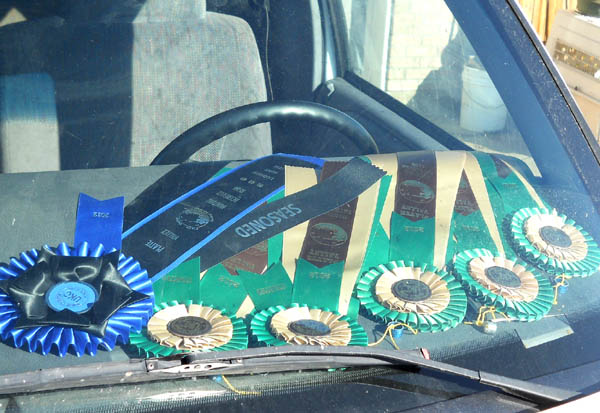
Ready to do it again?
I hope so!
Take stock of how you and your dog did and what weaknesses you should work on. Make a plan for how you can do better and then work the plan.
Other organizations
There are other retriever competitive associations:
This post was originally published on January 24, 2022. Edited and updated with new content on August 21, 2023.
Header image courtesy Linda Alexander
